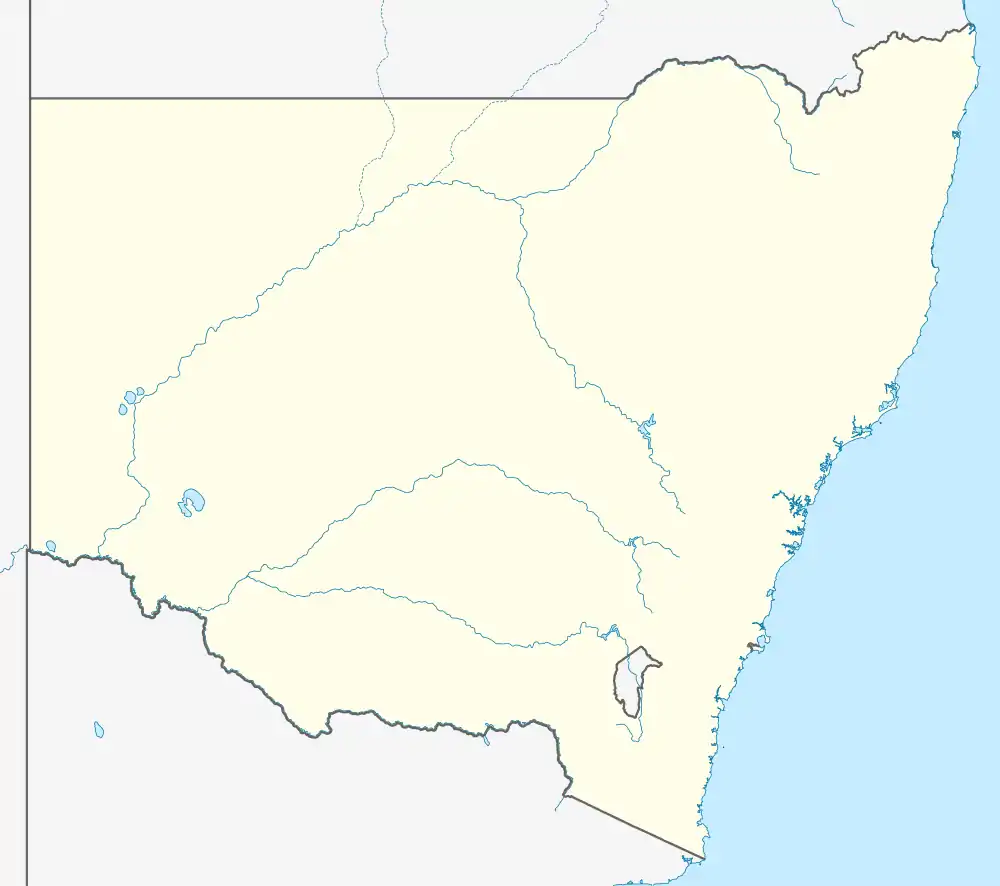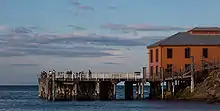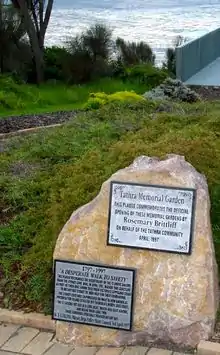Tathra, New South Wales
Tathra (/ˈtɑˑθrə/) is a seaside town on the Sapphire Coast found on the South Coast, New South Wales, Australia. As at the 2016 census, Tathra had a population of 1,675.[1]
| Tathra New South Wales | |
|---|---|
 Tathra, New South Wales | |
 Tathra | |
| Coordinates | 36°44′S 149°58′E |
| Population | 1,675 (2016 census)[1] |
| Postcode(s) | 2550 |
| Location | |
| LGA(s) | Bega Valley Shire |
| State electorate(s) | Bega |
| Federal Division(s) | Eden-Monaro |
Nearby points of interest are the Old Tathra Wharf, Mimosa Rocks National Park and Bournda National Park. Mimosa Rocks National Park starts at the northern end of Tathra Beach and runs north for about 16 km. It has five access roads from the Tathra-Bermagui main road. Bournda National Park starts at Kianinny Bay, at the southern end of Tathra, and runs south for about 13 kilometres (8.1 mi). There is a walking track near the coast, along most of its length.[2]
The Bega River flows into the sea at the northern end of Tathra Beach, which is about 3 kilometres (1.9 mi) long.
Tathra is said to mean "beautiful country" or "place of wild cats" in a local Aboriginal dialect.[3]
History


The Tathra area lies within the traditional lands of the Djiringanj people, a group of the Yuin.[4] The headland at Tathra is the site of a shell midden, which indicates it was a place favoured by the original inhabitants and a source of food. [5]
Tathra was first settled by Europeans in the 1820s and 1830s, although it was outside the limits of a legal settlement, the Nineteen Counties. After a period of dispossession from much of their lands and coexistence with the settlers in the Bega Valley, the Aboriginal population was removed to the Wallaga Lake Aboriginal Reserve, under the control of the Aborigines Protection Board of New South Wales.[6][5]
A small jetty was built at Tathra in the early 19th century. In 1861-62, a larger wharf was built from funds donated by farmers and the Illawarra Steam Navigation Company. Regular shipping commenced in 1862.[7] The wharf, built on turpentine supports set into solid rock, was restored by the National Trust, Department of Planning, and local residents. It is the only remaining coastal steamer wharf in NSW.[8]
In 1945 a local Volunteer Fire Brigade was established. In 2011 the Commissioner of the NSW Rural Fire Service opened a new station next to the older Station which had been in place since the early 1970s. In December 2020 the town's Fire Station received a major upgrade including the addition of a dedicated training and meeting room which featured the latest in modern technology including video conferencing. Tathra Fire Brigade is now one of the most well-equipped brigades on the Far South Coast and with weekly training, it has also come to be one of the most active brigades.[9]
As with the Fire Brigade, the town also has a Surf Life Saving Club.[10]
In 2008 two children fell from the wharf. Their father jumped in to attempt their rescue, but all three drowned.[11]
On the morning of 3 April 2014, Christine Armstrong, a member of the Tathra Surf Life Saving Club was taken by a shark believed to be approximately 4 metres (13 ft) long. Mrs Armstrong was swimming between Tathra Wharf and the Tathra Beach with a group of friends and her husband Rob. The shark was never located. This attack is believed to be the first attack in around 100 years and is extremely odd as Tathra rarely sees Sharks close to the Bay.
2018 bushfires
On 18 March 2018, a bushfire began in the locality of Reedy Swamp, near Tarraganda, which spread east towards Tathra.[12] By the evening the fire had reached the town, destroying homes and blocking one of only two roads out of the town.[13] Around 130 homes were either destroyed or damaged.[14] An emergency evacuation centre for people affected by the fire was set up at the Bega Showgrounds.[15] On 19 March (Monday), multiple schools in the area were closed due to students and staff being affected by the fire, namely Bega High School, Tathra Public School, Tanja Public School and the Bournda Environmental Education Centre.[16] As of 10:40pm on the 18th 1,000 hectares had been burnt.[17] By the morning of 19 March up to 70 buildings were believed to have been lost, and more than 200 people sought shelter at the Bega evacuation centre.[18] On the afternoon of the 19th, the New South Wales Rural Fire Service (RFS) confirmed that 69 homes were destroyed and 39 were damaged, and 398 houses were saved or untouched.[19] The RFS has stated that the total number of buildings destroyed is most likely 'seventy-plus'.[20] NSW Premier Gladys Berejiklian, Bega state MP Andrew Constance, federal MP Mike Kelly and Prime Minister Malcolm Turnbull visited Tathra soon after the fire and met with evacuated people at the Bega Showgrounds.[21]
Heritage listings
Tathra has a number of heritage-listed sites, including:
- Wharf Road: Tathra Wharf[22]
Transport
Tathra Road connects the regional centre of Bega 18 km to the west. Until the early 21st century, Tathra Road was known as the Snowy Mountains Highway, which now runs between Bega and the Hume Highway via Cooma and Tumut.
The Sapphire Coast Drive connects Tathra with Merimbula 25 km to the south and Tathra-Bermagui Road connects to the fishing port of Bermagui 44 km to the north.
Tathra is served by the local Bus Company Sapphire Coast Bus Lines. Sapphire Coast Bus Lines purchased the runs from the Daly family early 2013. The Daly Family operated the Bus Services from 1982 under the name of Tathra Bus Service.
References
- Australian Bureau of Statistics (27 June 2017). "Tathra (state suburb)". 2016 Census QuickStats. Retrieved 25 November 2013.

- "Tathra". Visit New South Wales. Retrieved 6 April 2013.
- "Tathra". Geographical Names Register (GNR) of NSW. Geographical Names Board of New South Wales. Retrieved 4 August 2013.

- "Tindale Tribes - Djiringanj". archives.samuseum.sa.gov.au. Retrieved 8 August 2020.
- Julie Dibden Bega Valley Shire Council Various Works - Aboriginal Cultural Heritage Assessment Report, 2017
- "The Aboriginal Station at Wallaga Lake". Sydney Mail (NSW : 1912 - 1938). 26 August 1925. p. 2. Retrieved 8 August 2020.
- "SHIPPING GAZETTE. - ARRIVALS. July 4. - Sydney Mail (NSW : 1860 - 1871) - 12 Jul 1862". Trove. Retrieved 20 August 2016.
- "Tathra Wharf and building at Heritage Council of New South Wales". Retrieved 25 November 2013.
- "Home". Tathra Rural Fire Brigade. Retrieved 6 April 2013.
- http://www.tathrasurfclub.com.au
- "Father, sons die in wharf tragedy". Sydney Morning Herald. Retrieved 25 November 2013.
- RFS, NSW (17 March 2018). "EMERGENCY WARNING - Reedy Swamp fire (Bega LGA) - Fire impacting on homes on edges of Tathra. Seek shelter as the fire arrives to protect yourself from the heat of the fire". @NSWRFS. Retrieved 18 March 2018.
- RFS, NSW (17 March 2018). "EMERGENCY WARNING - Reedy Swamp fire (Bega LGA) - Fire impacting on #Tathra. Seek shelter. It is too late to leave". @NSWRFS. Retrieved 18 March 2018.
- "Up to 35 homes, school lost to bushfire on NSW south coast". The Daily Telegraph. 18 March 2018. Retrieved 18 March 2018.
- Smyth, Ben (18 March 2018). "Tathra evacuated as out of control bushfire destroys property". Canberra Times. Retrieved 18 March 2018.
- "Major Fire Update Details". www.rfs.nsw.gov.au. Retrieved 18 March 2018.
- "Bushfire Emergency Warning: Reedy Swamp, Bega". www.google.org. Retrieved 18 March 2018.
- "Firefighters fear 70 homes and buildings lost in NSW south coast bushfire". ABC News. 19 March 2018. Retrieved 18 March 2018.
- "'Stay away': 69 houses lost in 'perfect storm' fire still burning in NSW town". ABC News. 19 March 2018. Retrieved 19 March 2018.
- Seventy homes and buildings destroyed in Tathra fire, Australian Broadcasting Corporation, 19 March 2018, retrieved 19 March 2018
- "Tathra residents urged to stay away amid asbestos fears". www.9news.com.au. Retrieved 19 March 2018.
- "Tathra Wharf and building". New South Wales State Heritage Register. Office of Environment and Heritage. H00405. Retrieved 18 May 2018.
| Wikimedia Commons has media related to Tathra, New South Wales. |